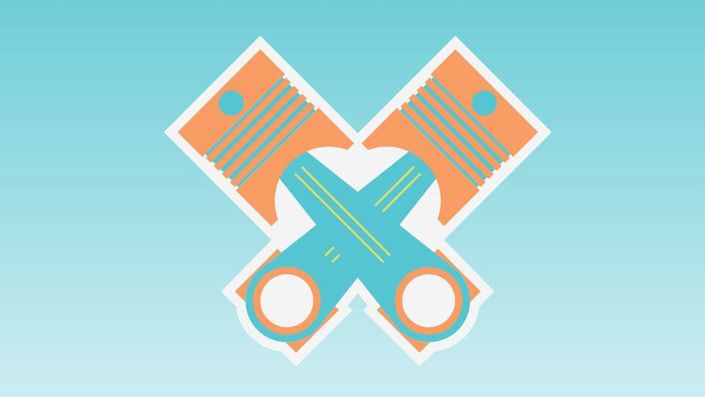
What is Thermodynamics?
Thermo is the branch of physics that deals with temperature and pressure and how they are related to work and energy. Thermodynamics applies to a wide variety of applications such as combustion engines, heating and air conditioning systems, and jet propulsion, along with many, many others.
What you'll get with the course
- 19.5 hours of on-demand lecture videos
- 39 fully-worked, challenging examples to teach you how to apply the material
- 24 quizzes with video solutions
- Downloadable outline of notes with all example problem statements to help you follow along with the lectures
- Downloadable steam table flowchart to help teach you how to select the correct steam table
- Certificate of Completion once you finish the course
- Email access to the instructor if you have questions about course content
- 14-day money back guarantee (please see the Terms here)
What you'll learn
This course covers all the topics needed to gain an understanding of the basics of thermodynamics. We will cover:
- Pressure and temperature
- Work and energy of closed systems
- Steam Tables
- Enthalpy
- Compressibility charts
- Ideal gas model
- Mass flow rates
- Work and energy of control volumes
- Thermodynamic efficiencies
- Entropy
- And more!
Click here to see the full curriculum
Course Curriculum
-
StartDownloadable Outline of Notes
-
Start1.1 Introduction (14:40)
-
Start1.2 Units and Example1 (8:05)
-
Start1.3 Specific Volume and Pressure (7:34)
-
Start1.4 Pressure Devices and Gage Pressure (12:49)
-
StartQuiz 1 Version 1
-
StartQuiz 1 Version 1 Solution (7:31)
-
Start1.5 Temperature (6:42)
-
Start1.6 Example 2 and Example 3 (14:23)
-
StartQuiz 1 Version 2
-
StartQuiz 1 Version 2 Solution (3:36)
-
Preview2.1 Kinetic and Potential Energy (13:11)
-
Preview2.2 Example 4 (8:32)
-
Preview2.3 Understanding Work (11:38)
-
Preview2.4 Example 5 (11:30)
-
Preview2.5 Example 6 (14:21)
-
StartQuiz 2 Version 1
-
StartQuiz 2 Version 1 Solution (7:38)
-
StartQuiz 2 Version 2
-
StartQuiz 2 Version 2 Solution (7:12)
-
Start2.6 Heat Transfer (9:42)
-
Start2.7 Energy Balance (8:35)
-
Start2.8 Example 7 (14:50)
-
Start2.9 Example 8 (16:50)
-
StartQuiz 3 Version 1
-
StartQuiz 3 Version 1 Solution (10:17)
-
StartQuiz 3 Version 2
-
StartQuiz 3 Version 2 Solution (9:54)
-
Start2.10 Cycles (19:29)
-
Start2.11 Example 9 (21:22)
-
StartQuiz 4 Version 1
-
StartQuiz 4 Version 1 Solution (12:12)
-
StartQuiz 4 Version 2
-
StartQuiz 4 Version 2 Solution (5:30)
-
StartSteam Table Flowchart
-
Start3.1 Evaluating Properties (14:10)
-
Start3.2 Phase Change (25:21)
-
Start3.3 Intro to Steam Tables and Linear Interpolation (15:47)
-
Start3.4 Steam Tables and Quality (13:04)
-
Start3.5 Steam Tables Example 10 (18:46)
-
Start3.6 Steam Tables Example 11 (12:56)
-
Start3.7 Steam Tables Example 12 (15:45)
-
Start3.8 Steam Tables Example 13 (7:42)
-
StartQuiz 5 Version 1
-
StartQuiz 5 Version 1 Solution (13:28)
-
StartQuiz 5 Version 2
-
StartQuiz 5 Version 2 Solution (5:50)
-
Start3.9 Enthalpy and Specific Heat (9:33)
-
Start3.10 Example 14 (18:44)
-
Start3.11 Property Approximation (10:57)
-
Start3.12 Compressibility Chart and Ideal Gas and Example 15 (18:04)
-
Start3.13 Ideal Gas (7:21)
-
Start3.14 Example 16 (13:01)
-
Start3.15 Example 17 (13:53)
-
Start3.16 Polytropic Process and Ideal Gas (3:45)
-
Start3.17 Example 18 (20:33)
-
StartQuiz 6 Version 1
-
StartQuiz 6 Version 1 Solution (8:23)
-
StartQuiz 6 Version 2
-
StartQuiz 6 Version 2 Solution (11:22)
Who should enroll in this course?
- Engineering students wanting to get a head start on an upcoming Thermo course
- Students currently taking Thermodynamics who need extra examples and explanations
- Students and professionals who are preparing to take the Fundamentals of Engineering Exam
- Anyone with an interest in learning about work and energy
What sets this course apart from others?
Being an instructor of Thermodynamics for many years, I understand the need for examples. So many instructors simply show a solution to a problem or only solve it halfway and just assume the student knows how to finish it. This used to be one of my biggest frustrations as a student so I can relate when I hear today's students complain about this.
To prevent this frustration, this course has many, many fully-worked example problems in a range of difficulty levels. Also, understanding units is important in this class. Because of this, I make it a point to explain all unit conversions throughout the examples.
Now, what good is learning material if you can't check your understanding, right? To assist with this, quiz problems are provided throughout the course. To check your work, video solutions of each quiz are provided.
In addition, the outline of the notes I use in the videos is provided as a downloadable file to help you follow along during the course.
Your Instructor

Teaching is my passion. As a University professor I have taught 1000's of students and watched them transform from freshmen into successful engineers. Unlike many STEM professors, I believe in teaching complex material in simple, easy-to-understand terms. I teach my courses in a way I wish I had been taught: straightforward lectures with plenty of examples on how to apply the theory being learned.
In addition to University experience, I also worked as an engineer for 8 years in industry at a well-known defense company. This experience enables me to focus in on topics that are actually applicable in the real world, not just textbook problems.
Come learn with me!
Will the material taught prepare me for other courses?
The relationships between pressure, temperature, density, work and energy are fundamental to so many areas. As such, this course will prepare you for more advanced topics like
- Combustion
- Heat transfer
- Fluid mechanics
- Propulsion
- Aerodynamics
- And many others
How's the course structured and what prior knowledge is needed?
You will have handwritten lectures followed by fully worked examples. There are NO PowerPoint slides used in this course. From my experience students learn best when following along and writing the notes versus just listening to someone talk while staring at a bunch of slides. And of course, throughout the class you will have the opportunity to test your knowledge using quizzes.
The examples we cover do use basic concepts from Calculus such as derivatives and integrals. In order to understand the material and examples you should know these concepts.
Textbook Info
As for the textbook, I will be using the 8th Edition of Fundamentals of Engineering Thermodynamics by Moran, Shapiro, Boettner, and Bailey. ISBN: 978-1118412930. Although not required, this book is a great resource and I strongly encourage you to get a copy for yourself. We will be covering the first 6 chapters of this text.
What are you waiting for? There's no better time than now to get started. Enroll today!
Disclosure: the textbook link is an affiliate link, meaning at no cost to you, I may earn a commission if you click through and purchase the book. That being said this is the textbook I use in all my thermodynamics courses and, regardless or whether you purchase it through the link or elsewhere, I do recommend it.
